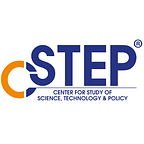All About Grammar, Gaffes, and Goofiness
By Sreerekha Pillai.
This article is the fourth in CSTEP’s Enrich series of blogs where we discuss what happens in a think tank beyond research. Read our previous articles on models for informed decision making, design thinking, and on editing at a think tank. In this article, our Chief Editor takes a light-hearted look at the Quality Control process, where the twain — left brain and right brain — meet.
Who said the Theory of Evolution is limited only to biological species? Language too evolves. In fact, Darwinian linguistics is a specific branch of linguistics, named after the father of the Theory of Evolution, Charles Darwin, that connects language to evolutionary biology and psychology. Thus, words, such as ‘climate emergency’ and ‘carbon neutrality’, which have gained currency unarguably in the last five years or so, mirror the modern reality of a world in dire need of a healing touch to prevent the apocalypse.
Any new word that mirrors societal changes, finds acceptance and a place in the haloed pages of the Oxford English Dictionary as word of the year, an honour as special as that reserved for the TIME Person of the Year. So, while new words gain entry into the precincts of the English language annually, the linguistic pyramid has been propped up for centuries by puritanical syntax, guarded by a tribe of gatekeepers involving language experts — teachers and editors. Language editors are often fictionalised as grammar cops, ready to strike their baton, aka pen, intolerantly at anything that even remotely impinges on the sanctity of the rules of syntax.
So, while editors try to hawkishly guard over the last vestiges of linguistic propriety, we are misunderstood as pedantic vultures waiting to prey on unsuspecting writers. For instance, how do you subtly tell those who have grown up believing that what, when, why, where, and how have to be accessorised by the all-important question mark that when you put ‘How to write better’ as a headline, it’s ripped off the quizzical punctuation mark? Similarly, that missing a single ’n’ can convert ‘impending’ (something that is about to occur) into ‘impeding’ (preventing or hindering), changing the context upside down with howlerious consequences.
The brains of scientific scholars somehow are hardwired to believe that everybody else occupies the same stratosphere as them, and that the intelligent jargon they converse in is part of normal everyday lingua. As editors working in a research-based think tank, we are still trying to make sense of ‘source-apportionment studies’, ‘satellite products to measure pollution’, ‘resilience building’, and ‘pumped-hydro energy’. But to assume that we would be particularly pleased to be bombarded with pages of chemical reactions is absolutely erroneous, when most of us are right-brained and suck at anything even remotely connected with equations and formulas. If this wasn’t the case, wouldn’t we have traded our pen and paper for your test tubes and beakers years ago?
Like any other creative process, outputs from a think tank too are the result of a copulation of minds. When researchers and editors confabulate, we exchange ideas and information. The cerebral process set afoot involves extra reading by the editor to ensure that the document carries that extra oomph. Thus, reading, contemplating, and rewriting are all part of an editor’s day — driven by the selfless passion for the output on the desk. And voilà, when you finally meet and greet your baby in print, all the sweat, toil, endless cups of cofee, and those hideous dark circles underneath the eyes are validated. Any writer with integrity would vouch that without the posse of editors, they would be lost at sea much like seafarers without the compass.
As the custodians of quality control, we are mandated to clear the clutter, dismantle unwieldy ideas, and rewrite complex sentences replete with technical jargon. In other words, we are the catalysts that distill your wisdom for policymakers and the public. Just to sound a cautionary note, simplicity and clarity of communication are not to be misinterpreted as dilution of the message. On the other hand, it’s the only way to diffuse your knowledge — far and wide.
The author heads the Quality Control team at CSTEP.
